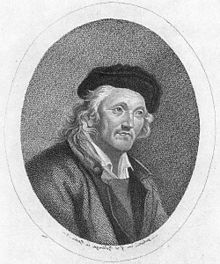
Johann Philipp Kirnberger (also Kernberg; 24 April 1721, Saalfeld – 27 July 1783, Berlin) was a musician, composer (primarily of fugues), and music theorist. He studied the organ with Johann Peter Kellner and Heinrich Nicolaus Gerber, and starting in 1738 he studied with the violinist Meil in Sondershausen, but most significant is the time he spent from 1739 until 1741 (with breaks) studying performance and composition with Johann Sebastian Bach.
Between 1741 and 1751 Kirnberger lived and worked in Poland for powerful magnates including Lubomirski, Poninski, and Rzewuski before ending up at the Benedictine Cloister in Lviv (then part of Poland). He spent much time collecting Polish national dances and compiled them in his treatise Die Charaktere der Tänze. Kirnberger played a significant role in the intellectual and cultural exchange between Germany and Poland in the mid-18th century.
Kirnberger became a violinist at the court of Frederick the Great in 1751. He was the music director to the Prussian Princess Anna Amalia from 1758 until his death.
Kirnberger greatly admired Johann Sebastian Bach, deeming him "the greatest of all composers". Kirnberger published Bach's Clavierübungen mit der bachischen Applicatur in the 1760s, and sought to secure the publication of all of Bach's chorale settings, which finally appeared after Kirnberger's death; see Kirnberger chorale preludes (BWV 690–713). Many of Bach's manuscripts have been preserved in Kirnberger's library (the "Kirnberger collection").
Kirnberger is known today primarily for his theoretical work Die Kunst des reinen Satzes in der Musik (The Art of Strict Composition in Music, 1774, 1779). The well-tempered tuning systems known as "Kirnberger II" and "Kirnberger III" are associated with his name (see Kirnberger temperament), as is a rational version of equal temperament (see schisma). One of his most familiar compositions is Fuga in C-dur für Orgel ("Fanfare" Fugue), which was formerly attributed to Johann Sebastian Bach and then to his son Carl Philipp Emanuel Bach.
References
- ^ "Johann Philipp Kirnberger (Composer, Music Theorist, Violin, Copyist, Bach's Pupil)", Bach Cantatas website
- Applegate, Celia, Bach and Berlin: Nation and Cullture in Mendelssohn's Revival of the St Matthew Passion, Cornell University Press, Ithaca and London, 2005, p. 15
- Allihn, Ingeborg (1995). "'Ein richtiges Gefühl von der natürlichen Bewegung' – Johann Philipp Kirnberger als Sammler von Nationaltänzen". In Dieter Gutknecht (ed.). Festschrift for Günter Fleischhauer's 65th birthday. Michaelsteiner Forschungsbeiträge 17. Oschersleben: Ziethen Institut fuer Aufführungspraxis. pp. 209–214.
- Allihn 1995, p. 209.
External links
- More information, including full text, of Kirnberger's Grundsätze des Generalbasses (178?) in the University of North Texas Music Library Virtual Rare Book Room
- Free scores by Johann Kirnberger at the International Music Score Library Project (IMSLP)
- "Larry Schou: The Kirnberger Chorales", University of Michigan School of Music, Theatre & Dance
- "18th Century Quotations Relating to J.S. Bach's Temperament" by Willem Kroesbergen and Andrew J. Cruickshank, Cape Town, October 2015
- Kirnberger: Fuga in C-dur für Orgel on YouTube, Mark Rich (organ), Wicks organ, Bethel Lutheran Church, Rochester, Minnesota